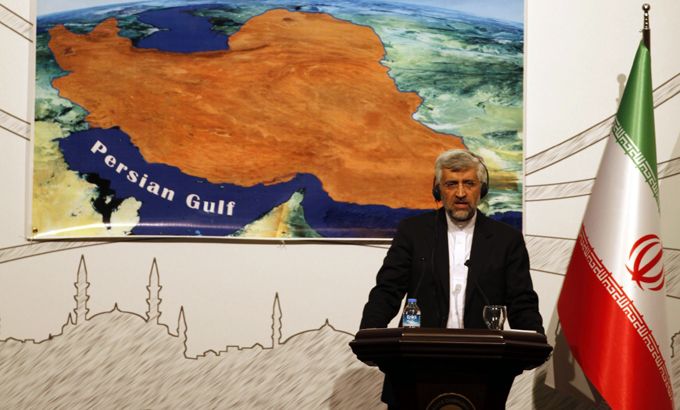
Iran nuclear talks: A positive first step?
As Iran and the world’s major powers engage in a new round of nuclear talks, we ask if a compromise will be reached.
On Saturday, six world powers and Iran launched a new round of negotiations in Istanbul aiming to resolve a dispute over Tehran’s nuclear programme that threatens to spark a war in the Middle East.
The talks brought together the US, Russia, China, Britain and France. Along with Germany, the five UN Security Council members are collectively known as the P5+1. It was the first such meeting in 15 months.
|
“I think all these sides want to avoid the war but Israel’s really interested in the war. First of all, to crush Iran’s nuclear objects because [of] security issues and also Israel doesn’t want very much for Barack Obama to be re-elected … Israeli leaders hate him.“ – Sergei Alexandrovich Markov, a Russian political analyst |
Over the last year, Western countries have intensified pressure on Iran with a range of sanctions designed to target the country’s energy sector and to isolate it from the international community.
In January, the European Union (EU) agreed to an oil embargo on Iran and a freeze on Iran’s Central Bank’s assets. And in March, the EU instructed the Brussels-based SWIFT financial messaging network to disconnect 25 Iranian banks.
But in February, the US went further with an almost total economic embargo on Iran, when it imposed a freeze on Iranian assets – thus putting more pressure on other countries to intensify their sanctions.
Although Western leaders argue that sanctions are specifically targeted at the government, they are also hitting ordinary Iranians hard. Staggering inflation has caused the price of food staples like meat and milk to skyrocket by as much as 50 per cent.
|
“The US and Israel have great ties. And I’m sure there are some differences between President Obama and Prime Minister Netanyahu. But the fact to think that one country is trying to attack another country to prevent an American president from being re-elected is just one of those ridiculous ideas. “ – Arash Aramesh, a national security and Middle East analyst |
The sharp drop in the value of Iran’s currency has also spiked the price of imported goods.
And, as intended, the sanctions are also having an effect on the country’s oil sector. Last month, exports dropped by 300,000 barrels per day and production fell to a 10-year low.
Analysts are predicting that by the summer, Tehran’s oil exports could fall by another 700,000 barrels a day.
Saturday’s meeting is widely seen as a chance to halt a downward diplomatic spiral, and to seek ways out of a deadlock. Further discussions are planned for next month in the Iraqi capital, Baghdad.
The gathering was also to persuade Iran to reduce its enrichment of uranium, and to fully open up its nuclear facilities to inspectors from the International Atomic Energy Agency (IAEA).
Iran says it is entitled to enrich uranium up to 20 per cent under the Non-Proliferation Treaty. It also insists that its nuclear programme is completely peaceful.
The US has called the talks a positive first step, and the Europeans have described it as constructive and promising. But what is different this time, and will a compromise be reached?
Inside Story, with presenter Divya Gopalan, discusses with guests: Sadegh Zibakalam, a professor of political science at Tehran University; Sergei Alexandrovich Markov, a Russian political analyst and vice president of Blethanov, the Russian University of Economics; and Arash Aramesh, a national security and Middle East analyst at Stanford University Law School.
|
“I think we have been clear in the statement for the following things. First of all, that the Non-Proliferation Treaty is the key basis upon which we will work. Secondly, that we are looking for Iran to fulfill all its international obligations. Thirdly, that we see a step-by-step process and we agreed that reciprocity will be a part of that.” Catherine Ashton, the European Union’s foreign policy chief |
TIMELINE: IRAN NUCLEAR TALKS
For a number of years, talks on Iran’s nuclear programme made no progress due to pre-conditions and rigid positions on both sides.
- October 2009 – Iran met representatives from the six world powers in Geneva, where a plan was approved to send 75 per cent of its low-enriched uranium to Russia and France
- May 2010 – Iran, Brazil and Turkey signed a nuclear fuel swap deal but it was not implemented due to lack of involvement by the US, France and Russia
- December 2010 – talks started again in Geneva between Saeed Jalili, the Iranian nuclear negotiator, and Catherine Ashton, the EU foreign policy chief. The discussions were on behalf of the five permanent members of the UN Security Council as well as Germany
- January 2011 – talks with the six world powers in Istanbul ended in failure
- March 2012 – the six world powers agreed to resume talks with Iran